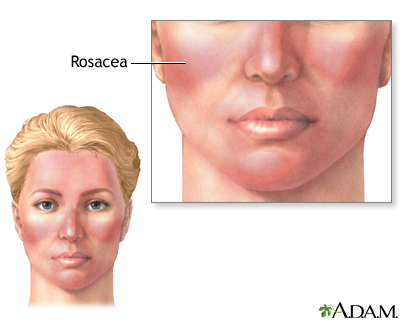Rosacea

What is Rosacea?
Rosacea is a common skin condition that causes redness and visible blood vessels in the face. It may also produce small, red, pus-filled bumps.
Who’s at Risk for Rosacea?
Rosacea typically affects adults over 30, and is more common in women, people with fair skin, and those with a family history of the condition.
What Causes Rosacea?
The exact cause of rosacea is unknown, but it may be due to a combination of hereditary and environmental factors. Certain triggers can worsen rosacea symptoms, including hot drinks, spicy foods, alcohol, temperature extremes, sunlight, stress, and certain medications.
How Does Rosacea Start?
Rosacea often begins with a tendency to blush or flush more easily than others. Over time, the redness may become more persistent and pronounced.
What Are the Symptoms of Rosacea?
Symptoms include facial redness, swollen red bumps, eye problems, and an enlarged nose. Symptoms may flare up for weeks to months and then diminish before flaring up again.
How is Rosacea Diagnosed?
Rosacea is diagnosed based on the presence of its characteristic signs and symptoms. There is no specific test for rosacea, but doctors may conduct tests to rule out similar appearing conditions like lupus or skin allergies.
How Can Rosacea Be Treated?
Rosacea treatment aims to control symptoms and improve skin appearance. This may involve topical medications, oral antibiotics, laser therapy, or lifestyle changes to avoid known triggers.
What Complications May Occur with Rosacea?
If left untreated, rosacea can lead to permanent changes in appearance such as skin thickening and eye complications, which can cause vision problems if not addressed.
How Can I Prevent Rosacea?
While rosacea cannot be prevented, identifying and avoiding personal triggers can help reduce flare-ups. Using sun protection and gentle skin care can also help manage symptoms.
Long-term Management of Rosacea
Long-term management includes ongoing treatment to control symptoms, regular visits to a dermatologist, and self-care measures such as gentle skincare and avoidance of triggers.
What is Recent Research Saying About Rosacea?
Recent research is investigating potential genetic links to rosacea, the role of the immune system, and new treatment approaches, including the use of certain natural compounds with anti-inflammatory properties.
Where Can I Go For More Information on Rosacea?
For more information on rosacea, visit reputable health websites like the American Academy of Dermatology, the Mayo Clinic, or the National Rosacea Society.

